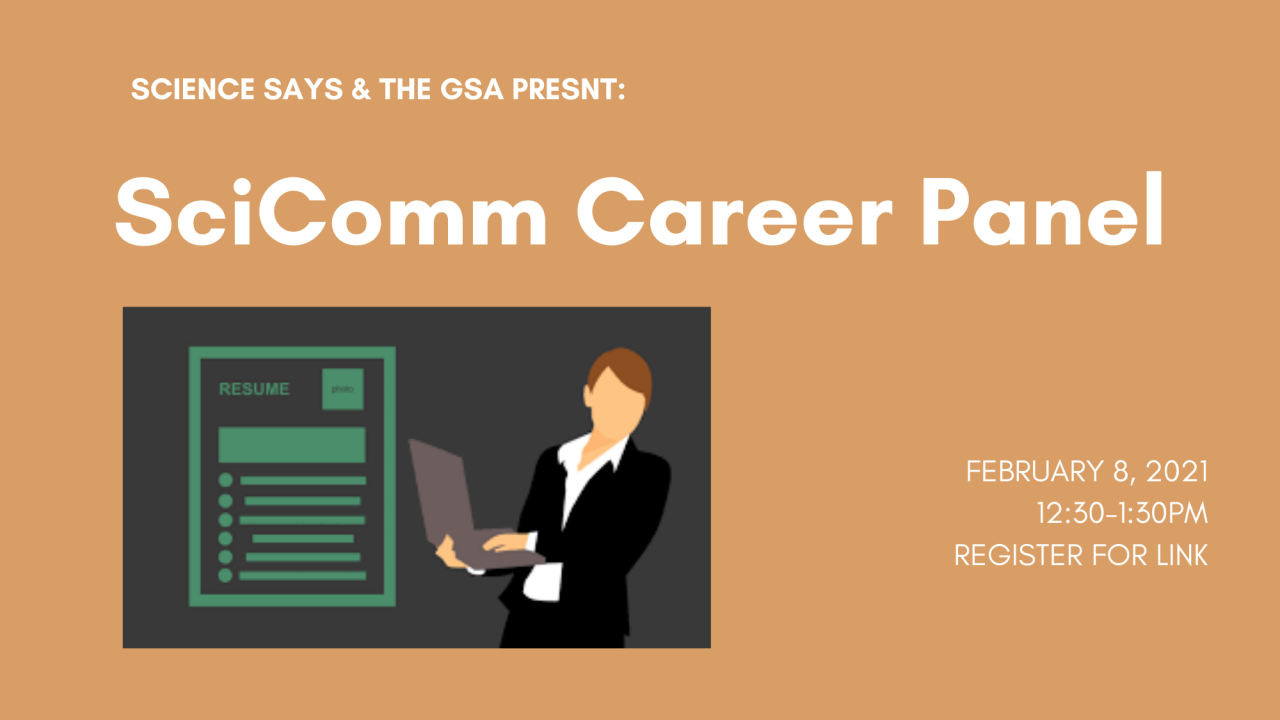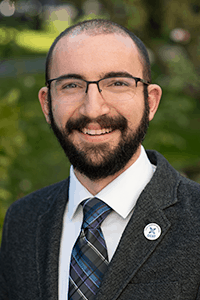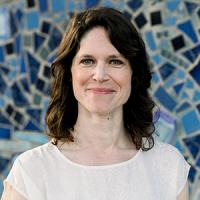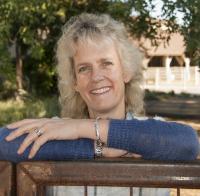
SciComm Career Panel
Science communication careers are varied and can be challenging to define. The UC Davis Graduate Student Association (GSA) in association with Science Says hosted a science communication career panel to increase awareness and offer opportunities to connect with professionals in a variety of fields.
We featured Drs. Grayson Doucette, Brittany Anderton and Alison Van Eenennaam representing scicomm careers in policy, digital media and academia, respectively.

Dr. Grayson Doucette currently serves in the Office of Assemblymember Dr. Joaquin Arambula. Immediately prior he was a fellow in the California Council Science & Technology (CCST) Policy fellowship serving on the California Senate Natural Resources and Water Commission after earning his PhD in Materials Science from Penn State University studying solar energy. You can find him on Twitter @GS_Doucette.
Dr. Brittany Anderton is the Associate Director of Research Talks at iBiology. She assists with the video production pipeline, leads the Share Your Research training program, and develops educational resources. She obtained her PhD in biomedicine from University of California, San Francisco, in 2015. After that, she did a non-traditional postdoc at UC Davis where she studied the teaching and communication of biotechnology. Brittany has served as adjunct faculty at UC Davis and CSU Sacramento, where she taught introductory biology courses. Ultimately, she wants to help improve the teaching and communication of science using evidence from the learning and social sciences. You can find her on Twitter @andertonbn.

Dr. Alison Van Eenennaam is a Cooperative Extension Specialist in the field of Animal Genomics and Biotechnology in the Department of Animal Science at University of California, Davis. She received a Bachelor of Agricultural Science from the University of Melbourne in Australia, and both an MS in Animal Science, and a PhD in Genetics from UC Davis. Her publicly-funded research and outreach program focuses on the use of animal genomics and biotechnology in livestock production systems. Her current research projects include the development of genome editing approaches for cattle. She serves as the bovine genome coordinator for the USDA National Animal Genome Research Program, and is an elected Fellow of the American Association for the Advancement of Science (AAAS). She has given over 700 invited presentations to audiences globally, and uses a variety of media to inform general public audiences about science and technology. She frequently provides a credentialed voice on controversial scientific topics, and has appeared on national media including The Dr Oz Show, NPR, Science Friday, and the Intelligence Squared debate series. She appeared in the 2017 documentary

“Food Evolution” narrated by science-communicator Dr. Neil deGrasse Tyson. A passionate advocate of science, Dr. Van Eenennaam was the recipient of the Association of Public and Land-grant Universities (APLU) 2010 National Award for Excellence in Extension, American Society of Animal Science (ASAS) 2014 National Extension Award, the Council for Agricultural Science and Technology (CAST) 2014 Borlaug Communication Award, University of California – Davis 2019 James H. Meyer Distinguished Career Achievement Award, and ASAS 2019 Rockefeller Prentice Award in Animal Breeding and Genetics. You can find her on Twitter @BioBeef.
Question and Answer
Could you comment on the biggest risk that pushed you out of your comfort zone, and how that affected your career?
Grayson Doucette: The biggest risk that pushed me out of my comfort zone was early in graduate school: the policy organization I was a part of started an event similar to many across the country for a science-and-beer thing at a bar. As part of the advertising campaign, I was able to get a regular spot for us on a local radio station to interview our speakers. For our first event however, our speaker couldn’t make the radio spot, and so another member and I went on instead to talk about our work. That was my first media experience, and answering questions on the spot about my work and what we were trying to accomplish for public consumption was scary and thrilling all at once. After having done that, I think it really helped expand my comfort zone.
"I think that is a word of caution: if you’re getting into science communication, especially when discussing controversial topics, there is a potential for reputational harm." - Dr. Alison Van Eenennaam
Brittany Anderton: At the end of my PhD, I recognized that I wanted to develop a new skill set and that certain fellowships would help me. The CCST fellowship is a very well-established fellowship for people who want to pursue something related to science, communication, and science policy and enter into a track that has a clear career path. There’s also the AAAS Mass Media Fellowship. I applied to both CCST and the President’s Postdoctoral Fellowship Program (PPFP) While I got an interview for the CCST fellowship, I decided to accept the PPFP instead because I wanted to go out on a limb and try and forge my own path, to see where this non-traditional experience would take me.
Alison Van Eenennaam: Appearing on The Dr Oz Show was particularly nerve-wracking. Dr. Pam Ronald had previously been asked to appear to also discuss [GMOs] and was basically ambushed on the show.I think it’s important to be involved in this discussion, and that’s why I think it’s worth the risk, but there is a lot of blowback especially around this topic in terms of attacks from groups that are opposed to the technology or funded to discredit scientists that speak out about it. I think that is a word of caution: if you’re getting into science communication, especially when discussing controversial topics, there is a potential for reputational harm.
What was the biggest challenge moving from the bench to digital media or policy?
Grayson Doucette: For me, the biggest challenge of moving from the bench into policy was learning how to temper the urge to do a full deep dive into an issue area when asked to get background information. While it is helpful in most cases to have more information, I needed to recognize that to be timely, helpful, etc, and that I should know when I have enough or when I need to move on to the next thing. We have years in academia to learn every nook and cranny of a problem, but change in the policy realm feels like more stops and starts: do something one year, come back in a few years to refine it.
"I needed to recognize that to be timely, helpful, etc, and that I should know when I have enough or when I need to move on to the next thing." - Dr. Grayson Doucette
Brittany Anderton: I would have to say it was pretty well set up for me. [iBiology] is a small media company, but we have a videographer, we have editors, we have people that work on the graphics. So while I did make a video from scratch on my own, the learning curve hasn’t been so steep because [of the support]. If I were at a different company, maybe more of that responsibility would fall on me. But I think what I've learned most is how to leverage the YouTube platform to reach new audiences and use the analytics. There have been some challenges [learning new YouTube tools] but I can’t say that I've developed a video editing skill set for example.
Is there a particular medium you think works best for influencing an audience?
"I don't think there's a silver bullet in terms of medium or strategy. Context is always going to be the determining factor." - Dr. Brittany Anderton
Grayson Doucette: This is a difficult one, because for me it comes to a question of scale and impact and depends on what you want to accomplish. If you want to gather as many supporters as possible, social media may connect you rapidly with individuals who already share a number of views you do and may more readily answer questions you put out there. However, if the goal is to really push someone on an issue who doesn’t share your opinion, face-to-face I think is still one of the best communication methods; it provides both verbal and non-verbal feedback that social media isn’t as equipped to do. Barring face-to-face, phone, radio, I think, with the automatic curation of online media, any avenue you can find to make the hop into adjacent media silos is the winner.
Brittany Anderton: I don't think there's a silver bullet in terms of medium or strategy. Context is always going to be the determining factor. What we can say from the evidence is that connecting people to topics using storytelling and narrative is effective. Our brains are hard-wired to put things into a story arc; it allows people to engage with certain content more, especially topics that might be polarizing or challenge their beliefs. Transparency about your intentions and values in addition to storytelling can also be effective. Connecting people with your value system grounds the conversation and meets them wherever they are in regards to a particular topic. This can be effective for connecting with people that are "on the fence.”
Alison Van Eenennaam: Just look at the last few years and it's pretty obvious that social media is the way to influence people. Unfortunately it has zero credence with academia. I think that things like Facebook obviously reach a lot of people, YouTube reaches a lot of people. I’m a fan of movies: so many people have said to me “nature finds a way” when discussing my research, and that was a fictional movie about a dinosaur!
I do think narrative storytelling is very effective. The trouble is most people are busy, and trying to reach the big group of people that are undecided about scientific topics is the biggest challenge. And you’ve got to meet them where they are. I think this is something academic science in particular really struggles with because it's just not rewarded in the academic system.
How can we reach people entrenched in their beliefs?
Grayson Doucette: It definitely depends on the topic. In regards to people who are entrenched, I think you have to accept that there are some people you don’t have the pre-existing relationship with or the rapport to change their minds. I think you can do your best to ask where they’re coming from, poke and prod with other questions that test their position to get the gears turning, but I’m not sure I’ve convinced someone who is all-in on a position without first having a good relationship with them. For those on the fence, again I think it helps to ask questions first which provides opportunities for empathy: “what would you think someone who is…. would think/be concerned about?” Sometimes I share my thought process on how I got to my conclusion and that’s helped at times since they can trace the same line.
"For those on the fence, again I think it helps to ask questions first which provides opportunities for empathy." - Dr. Grayson Doucette
Brittany Anderton: Assume that your audience has good intentions, and if you find that there are certain audience members that have bad intentions, those are not the people to engage with. For example, with vaccine hesitancy, people are making choices based on the information available to them and their value system they think are good for themselves and their family. So respecting their intentions but trying to convey information and why your values might be different or why your values may lead you to a different conclusion is the right approach. But certainly if you find people that are very dug in and anti-science, it may not be worth the effort.
Alison Van Eenennaam: If someone is really dug in, I don’t think it's helpful. I think we spend a lot of time with those very vocal opponents when actually most people are in the middle. I think if you do engage [with the vocal opponents], the people in the middle are watching to see how you behave. Keeping it civil is important, but I think that it's worth much more to spend time trying to address those people in the middle.
Do you believe that a Master’s or PhD is required for a career in science communication or are there other things that are more important or better suited?
Grayson Doucette: I don’t believe a graduate degree is required for a career in science communication; however, I believe that you absolutely need it to develop research skills. As long as you have a willingness to ask questions and learn about the science issues, you’re communicating and I think you will be very effective. As an example, in my current role, I’m certainly not trained in banking and finance or insurance, but to discuss policy and make recommendations with any authority I need to be able to dig into a subject and know what to look for, and find folks smarter than me to explain questions I run into.
Brittany Anderton: It’s context dependent. For my position, we really need PhDs because we’re interfacing with more than just non-experts. Many people use iBiology videos as a stand-in for seminars, so that’s scientists communicating to scientists. That requires an in-depth understanding of the scientific process, how to digest papers, how to translate that into a research talk, But beyond that there are other types of science communication like journalism where you don't have to have a Master’s or PhD.
Alison Van Eenennaam: I think it depends on the field. There are plenty of good science communicators that don't have a PhD. Bill Nye only has a Bachelor’s and is very successful. If you want to teach at a four-year university, you need a PhD, but if you want to be a science communicator you don't necessarily need one. I think it’s more about the skillset and passion you bring to the job.
How do you strike a balance between oversimplifying or “dumbing down” without overwhelming your audience with information?
"Effective science communication isn't so much translating as it is sitting and thinking about who it is you're attempting to reach." - Dr. Brittany Anderton
Grayson Doucette: I don’t think I’ve ever gotten the balance just right, and audiences can be so diverse I think it comes down to practice and on-the-spot adaptability. The more audiences you engage, the more practice you get in seeing the start of the glazed over look or use check-in questions about comprehension and adapt in the moment to what you’re presenting. Working as a TA is excellent practice for this as you’ll get students asking questions at all levels of comprehension and requires you to adapt and try new explanations for the same material that helps train that same “backup explanation” for what you’re talking about.
Brittany Anderton: Effective science communication isn't so much translating as it is sitting and thinking about who it is you're attempting to reach. What do they care about? What are their ways of traditionally communicating and how can you connect with them? What are the main things you want to convey? I think it takes a strategic multi-dimensional view instead of how to translate point A to point B for a different audience without jargon.
Alison Van Eenennaam: Everything your professors do, do the opposite. Typically they start off with a hypothesis and materials and methods, etc, and at the very end they get to the conclusion. Start with the conclusion! That’s the problem you're trying to address, why does your audience care about that problem? I think scientists have a hard time believing that people don't want to hear the scientific details. It’s a different communication style with the public as compared to what you're expected to do in lectures.
Viral content on social media tends to over emphasize certain information. How do you find the balance between trying to reach many people while staying objective and not over exaggerating?
Grayson Doucette: All I can say is that, when we choose to engage on a subject, we all have biases and different connections with a topic which will influence how we engage. So while data that is discussed may be straightforward, I think it’s important to recognize our limits as an organization or individual in objectivity.
Brittany Anderton: Content going viral or not isn't the only measure of success. I'm just as satisfied with videos that I produce that get 1,200 views as I am with my videos that get 50,000 views because I know they are conveying information that is helping to inform people and change the way they think or learn something about certain topics.
Alison Van Eenennaam: Scientists can't say dramatic things and we can't lie. Often, lies are much more interesting than the truth and it's much easier to scare people than reassure them. My balance is I don't overemphasize. So therefore I probably have a limited audience on social media because it's not dramatic and sensational, but at the end of the day, I have to be honest to my scientific integrity. There’s also some things that limit how much into the discussion you can get. If your account is linked to the university for example, you have to stay professional.
Final Comments
Grayson Doucette: Go try it out and get it right sometimes, and wrong a lot of times while you still have the breathing room. A lot of the training opportunities, student groups, and events become sparser (and more expensive).
"We have to engage. I don't think that we’ve got it right yet, but doing nothing is not an acceptable option." - Dr. Alison Van Eenennaam
Brittany Anderton: People really respond to visuals and graphics; it's for good reason that the content on Facebook that ends up going viral include images and videos. So, as much as you can, start tinkering around with ways to convey your science visually. BioRender is a fantastic free tool to help you get started.
Alison Van Eenennaam: We have to engage. I don't think that we’ve got it right yet, but doing nothing is not an acceptable option. Particularly your generation, you need to look at what works and mimic that in your science communication. And maybe learn what works well on social media. And finally, how can we harness that to help communicate science?
Thank you to Drs. Grayson Doucette, Brittany Anderton and Alison Van Eenennaam for their time and wisdom.
Sydney Wyatt is a PhD student at the University of California in Davis. For more content from the UC Davis science communication group "Science Says", follow us on Twitter @SciSays.

Comments